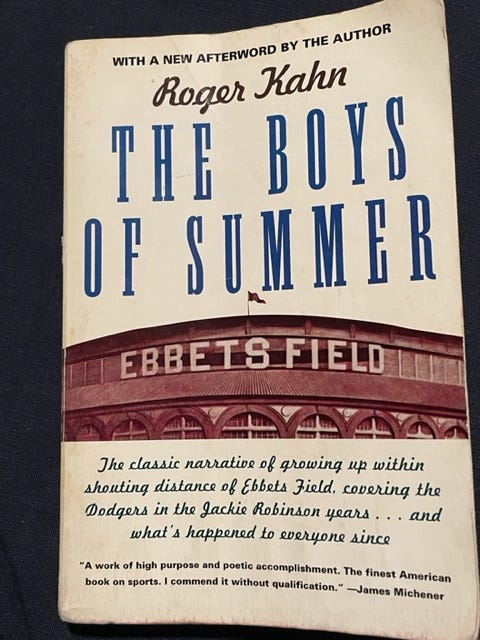“….That’s as Far as I Was at That Time.”
....Why didn’t I say, "Something’s wrong here. I’m not going to let this happen."
Just finished Roger Kahn’s “The Boys of Summer.” Despite being a huge baseball fan and entranced by its lore, I somehow waited more than 50 years after its original publishing to read it.
It is a poetic piece of non-fiction, autobiographically describing what it was like to grow up in the Brooklyn of the 1930’s in an intellectual Jewish family with a dad who loved baseball, and to become a newspaper reporter and luck into the plum assignment of covering the Brooklyn Dodger teams of the late ‘forties and 19-fifties...To travel with the team when they still took trains from city to city, mingle with the players and other writers at dinner and in the bar, amidst the political and social ferment of the time, and see it play out in the Dodger clubhouse and on the field.
Decades after their glory years, Kahn visits with the great Dodgers of the time – Reese, Snider, Hodges, Campanella, Pafko, Cox, Furillo, Erskine, Roe…and of course, Jackie Robinson – revisiting both the baseball and the relationships.
These players were mostly blue-collar, and all had to work hard after retiring. No free agency or multi-million dollar contracts in those days. As Newsweek’s reviewer wrote at the time:
“Not just another book about baseball, but a book about pain and defeat and endurance, about how men anywhere must live.”
Perhaps the most memorable story I gleaned from the book came from one of those Dodgers’ ace pitchers, Carl Erskine, who told Kahn:
“Whenever Jack came to the mound, he always gave me the feeling he knew I could do the job. He just wanted to reassure me. Whatever words he used, the effect was: There’s no question about it. We know you can do it. Here’s the ball. Get it done. Times when I wasn’t sure I could do it myself, he seemed to be.
Now here’s what bothers me. He wins a game. We go to the next town. We’re all on the train, a team. But leaving the station, he doesn’t ride on the team bus. He has to go off by himself. He can’t stay in the same hotel. But I didn’t do anything about it. Why? Why didn’t I say, ‘Something’s wrong here. I’m not going to let this happen. Wherever he’s going, I’m going with him.’
“I never did. I sat like everybody else, and I thought, ‘Good. He’s getting a chance to play major league ball. Isn’t that great?’ And that’s as far as I was at that time.”
-- Carl Erskine, Brooklyn (and LA) Dodger pitcher, 1948-1959
Erskine told a story from his youth in Anderson, Indiana. Before he was ten, in Marion, a town thirty miles to the north, there had been a lynching of two Black men who were taken from the jail and hung in the jailyard. His father drove him to the site the next day, to show him where it was, and impress the horror of it upon him. Another hard lesson he learned: “People had made off with souvenirs.”
Some of the worst indignities visited upon Robinson and his Black teammates occurred in Florida, leading the team to schedule all or most of several Spring Trainings in the Dominican Republic or Havana.
….More history that the current Florida governor would bury, rather than hurt anyone’s feelings….




